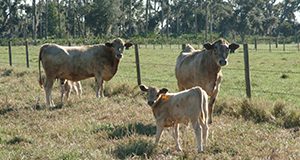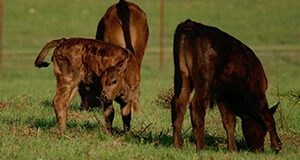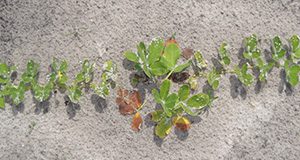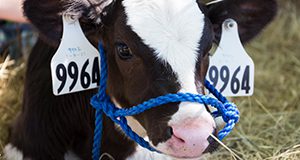Because of its adaptability to Florida's environmental conditions and ability to produce viable seeds, pintoi peanut represents an interesting forage alternative for cow-calf producers in the state. This 5-page document provides current information on pintoi peanut for forage and livestock producers in Florida. Written by Joao M. D. Sanchez, Joao Vendramini, Maria L. Silveira, Jose C. B. Dubeux Jr., Lynn E. Sollenberger, and Philipe Moriel, and published by the UF/IFAS Agronomy Department, November 2020.
https://edis.ifas.ufl.edu/ag445
Tag: Philipe Moriel
Nutrition at Early Stages of Life Determines the Future Growth and Reproductive Performance of Dairy Calves
For a calf, nutrition during the first few months of its life may permanently change the way organs develop and then have long-term consequences. The concept that metabolic imprinting may permanently affect animal development has substantial economic implications for agriculture. This 6-page fact sheet summarizes some of the research conducted in calf nutrition and its impact on the growth and reproductive performance of dairy calves. Written by Philipe Moriel and Luiz Ferraretto, and published by the UF/IFAS Department of Animal Sciences, December 2017.
http://edis.ifas.ufl.edu/an336
Nutrition at Early Stages of Life Determines the Future Growth and Reproductive Performance of Beef Calves
 Nutrition can influence future health and performance of calves. The metabolic imprinting concept has substantial economic implications for animal agriculture, and it should be explored to improve the performance of animals bred for food production. This 6-page fact sheet summarizes some of the research conducted in beef calf nutrition and nutritional impact on growth and reproductive performance of beef calves. Written by Philipe Moriel, and published by the UF/IFAS Department of Animal Sciences, October 2017.
Nutrition can influence future health and performance of calves. The metabolic imprinting concept has substantial economic implications for animal agriculture, and it should be explored to improve the performance of animals bred for food production. This 6-page fact sheet summarizes some of the research conducted in beef calf nutrition and nutritional impact on growth and reproductive performance of beef calves. Written by Philipe Moriel, and published by the UF/IFAS Department of Animal Sciences, October 2017.
http://edis.ifas.ufl.edu/an335
Additional Nutritional Considerations for Preconditioning Beef Calves
 Feed ingredient selection is not the only factor to consider during a preconditioning process. Recent studies demonstrated that diet composition and frequency of supplementation can have positive or negative effects on calf performance during preconditioning. This 7-page fact sheet focuses on the ways beef cattle producers can modify the nutritional composition of diets and frequency of concentrate supplementation to optimize growth and immunity of preconditioning beef calves or prevent detrimental effects. Written by Philipe Moriel, and published by the UF Department of Animal Sciences, September 2017.
Feed ingredient selection is not the only factor to consider during a preconditioning process. Recent studies demonstrated that diet composition and frequency of supplementation can have positive or negative effects on calf performance during preconditioning. This 7-page fact sheet focuses on the ways beef cattle producers can modify the nutritional composition of diets and frequency of concentrate supplementation to optimize growth and immunity of preconditioning beef calves or prevent detrimental effects. Written by Philipe Moriel, and published by the UF Department of Animal Sciences, September 2017.
http://edis.ifas.ufl.edu/an334

